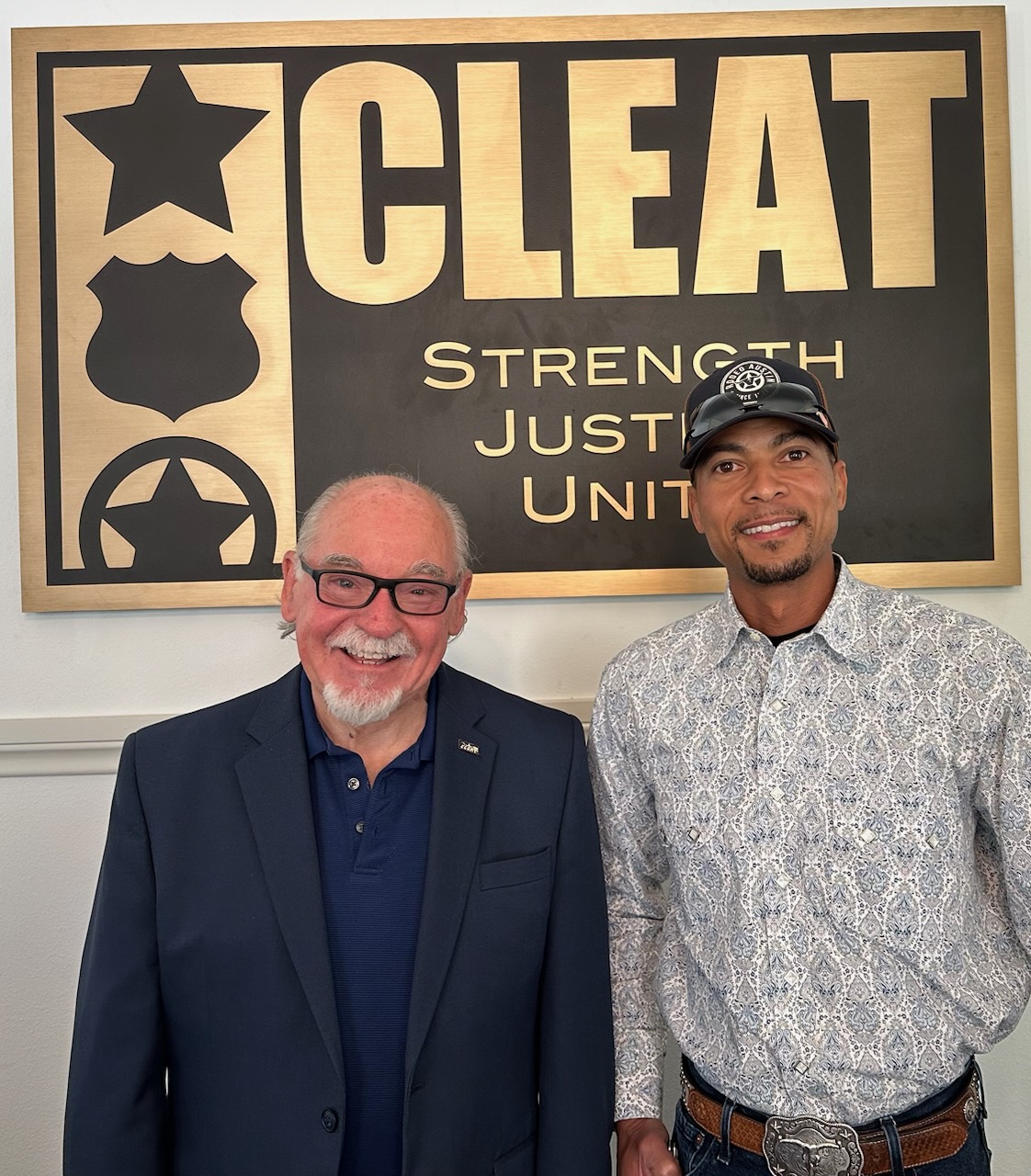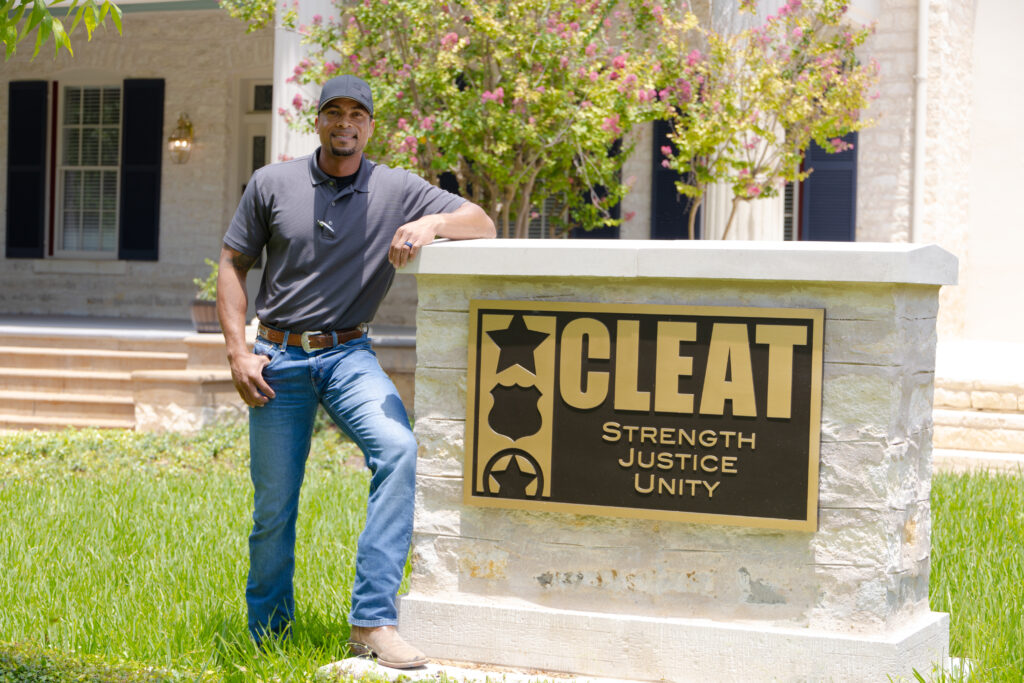

TMPA Legal Let-Down
The JJ Johnson Story
By Katy Dean
CLEAT Communications
 What started as a critical incident in 2019 for then-TMPA member JJ Johnson turned into a nightmare nearly a year and a half later. During an interview Friday afternoon, the former Williamson County Deputy had a chance to tell his story at CLEAT HQ in Austin. Johnson spoke of his membership with TMPA, the unconscionable way in which they dropped him when he needed them the most, and how CLEAT stepped up to help.
What started as a critical incident in 2019 for then-TMPA member JJ Johnson turned into a nightmare nearly a year and a half later. During an interview Friday afternoon, the former Williamson County Deputy had a chance to tell his story at CLEAT HQ in Austin. Johnson spoke of his membership with TMPA, the unconscionable way in which they dropped him when he needed them the most, and how CLEAT stepped up to help.
In March of 2019, Williamson County deputies James (JJ) Johnson and Zach Camden were involved in a critical incident resulting in a fleeing suspect’s death. Both were TMPA members. JJ Johnson had been a member in good standing with TMPA since graduating from the academy in 2012. “I never left TMPA. Through three agencies and all the years, I never left them. I never had to use them either,” said Johnson, who admittedly had no issues contacting TMPA for representation at the time of the incident.
“The night of my incident, after performing lifesaving techniques, I called the after-hours number at TMPA and let them know that I had been involved in an incident and needed representation,” he said. “They sent out legal representation that night. That representative stayed with us through everything for 17 months. It was not until June 8, 2020, that we received a text message that we would have to find new legal counsel.”
So what happened in early June of 2020 that led to Johnson being dropped so suddenly—via text? Riding the coattails of public interest in the George Floyd incident, a local journalist based in Austin released a story that suggested foul play and excessive force by the Williamson County deputies. “It was about my case that happened 17 months prior, but it ran parallel to the George Floyd event and looped us into that,” stated Johnson. “Soon as it hit the media, we got a text message that night, and that’s how we found out that we were no longer going to be represented.”
His initial reaction to being dropped from TMPA was, justifiably, confusion. “I didn’t understand why we were being dropped. Why now? Why 17 months later? To this day, it does not make sense to me. I thought maybe there was a mistake, maybe if we talked to the board or whoever… I wanted to know why the decision was made,” Johnson stated. “It’s the worst moment of my life, my career, and I thought I had this safety net for years. I needed it, my family needed it—we were let go.”
Johnson did have a chance to speak with the TMPA board, including Executive Director Kevin Lawrence, via Zoom. Afterward, TMPA sent a written letter stating they would hold their position and not cover him in this matter.
When asked if they ever gave him a reason, Johnson stated that they reasoned that he stopped paying his dues. “Which is true,” he said. “Months after my incident, I did remove myself from TMPA because of their outward public support for the opposing Sheriff.”
Johnson mentioned that he brought to TMPA’s attention that their social media posts and Lawrence’s social media posts endorsing the opposition put members who worked for the incumbent Sheriff in a difficult position. “It was very blatant, and they didn’t care that they were putting their members in a tight spot with our current employer. It’s not a fun position to be in. They said they understood, but they didn’t stop,” he said as further reason for his parting with TMPA. “This was months after the incident though. At the time of the incident, I was a paid member of TMPA.”
Alternatively, at CLEAT, a member’s dues are suspended during extended periods of unpaid leave or when that member is indefinitely suspended until we get them back to work. In a case like this, where he was a paid member at the time of the critical incident, had Johnson been a CLEAT member, there would have been no question of coverage based on payment of dues.
“Do you believe TMPA had a fiduciary, legal, ethical, and moral obligation to you as a member,” we asked.
“That they did. They did. I was a dues-paying member the night of my incident and for years prior to that, and for a little while after,” he responded. “I worked with them as a president of an employee’s association at another sheriff’s office, so I was entrenched with them and knew them very well. I was a die-hard TMPA member for my entire career.”
TMPA did end up paying for Zach Camden’s legal costs but upheld their denial of coverage for Johnson even after two appeals, leaving Johnson and his family in a bind he never thought they would be in. “I was worried about trying to find legal counsel… we did not know how we were going to pay for it. It’s something we never thought we would be in the position to have to worry about,” he said.
“CLEAT, who I’m forever grateful for, had no obligation to stand by me, to step in, help us find new legal counsel, help us with finances, stay in contact with us, help our families, wish us well, consistently for years and even after the case was done,” said Johnson. “When you’re going through this and you see the protests and the headlines that are twisted to someone else’s benefit, especially being a public servant when people want to defund cops or wish them dead, and all these groups and government officials are jumping on this bandwagon, it makes you feel like there’s no good left. When someone like CLEAT comes along out of the blue, it kind of gives you a little faith to keep moving. To keep pushing. Good will prevail,” he continued. “When CLEAT did that, I remember leaving and just breaking down in my car. It was a great feeling in the worst time.”
The entire trial lasted just nine days in court, beginning in late February of this year and ending quickly, with a verdict of “not guilty” on March 7th. It had been five years since the incident—half a decade for the deputies and their families living in limbo.
We asked Johnson how he felt after the verdict. “It’s a relief. Going through the legal process and coming out with a full ‘not guilty’ verdict within hours, you would have thought that someone who receives that news after all of these years and headlines would be doing backflips, but it wasn’t that feeling,” he said. “It has stopped my professional life. Even though now, years later, we were exonerated 100%, I’m still a Google search. The damage to my children is done. I always took a lot of pride in my background in law enforcement. I was a very proud cop. Very public. You go from this period of being a good guy, publicly in your community… to being deemed a murderer or you did something based on race. That was a shock to me. I’m black with bi-racial kids. I’ve been black my entire life. That was really hard that anybody would buy into that. I worked my own protest, which is something I can’t explain.”
 “We’re grateful that a jury reversed this path of injustice aimed at JJ particularly and law enforcement in general. I’m appreciative of Attorney Doug O’Connell and his firm for their hard work on this case,” said Charley Wilkison, Executive Director of CLEAT.
“We’re grateful that a jury reversed this path of injustice aimed at JJ particularly and law enforcement in general. I’m appreciative of Attorney Doug O’Connell and his firm for their hard work on this case,” said Charley Wilkison, Executive Director of CLEAT.
“CLEAT’s been there, and there’s nothing I could ever do to repay that feeling or the peace of mind that CLEAT has provided my family. There’s just no words. No one wanted anything to do with us. Nobody. CLEAT did it because it was the right thing to do,” said Johnson. “They cared about me and my family, and that was just rare. You get a not-guilty verdict on national TV and everybody comes out of the woodwork, but you remember who wasn’t shy or scared to be standing next to you when it wasn’t popular. TMPA wasn’t there. Just hours after the closing arguments and we got the not-guilty, TMPA came out of the woodwork as if they contributed to our not-guilty—to the process that we went through—when, for me, they just made more turbulence. It was a big case, it was watched by a lot, and I thought they took that moment to promote themselves. They never said, ‘we dropped JJ.’”
As a former member with first-hand experience, we also asked for his opinion on TMPA’s new constitutional amendment, which now lists “Conduct Unbecoming” as a reason for termination of membership.
“It gives them justification, which they did not have the night of my incident or the night they decided we needed to find new legal counsel. It begs the question, ‘Why do you exist? Is it for the good of your people or for yourselves?’ I think that amendment tells you it’s to benefit TMPA. Do you know how broad Conduct Unbecoming can go? Me chewing gum indoors may be Conduct Unbecoming for some, and when do you know that—when you need them most? It’s a false shield to benefit them, and that tells you what they think of the members,” said Johnson. “These are rough times. It’s always a tough job to be a cop or any kind of public servant, and things are going to happen. That little bit of peace of mind is out the window with policies like this. It’s gone. For any dues-paying member, that is gone. You have to worry about so much as a police officer these days—your local government, the DA, public pressure changes things, and now this too? Why? Why would you even waste your time? TMPA’s new policy to terminate members at their will due to Conduct Unbecoming is subpar for any agency that stands on ‘we’re here for members.’”
When asked if he would have done anything differently, the only thing he said he would change was to have looked further into the business practices of the organization he was signing up with for coverage. “I would have done more research into my legal representation—into TMPA. I never worried about it because I thought I had that umbrella of TMPA standing by its members. Seventeen months later, it wasn’t convenient for TMPA to stand with us through that time,” he said.
For those in law enforcement or looking to go into law enforcement in the state of Texas, he has this advice from personal experience:
“One thing that I learned post-verdict is how both of these organizations are set up—CLEAT and TMPA. I did not know that TMPA took money from [politicians] at the capitol. I did not know that that helps their funding. I thought it was just the dues. I think if I would have known, that probably would have struck a chord with me because when people pay an organization, they expect something in return. I did not know that until my situation was already at a 10.”
Seeing past the façade is often easier in hindsight and can come at a substantial cost. It’s apparent at CLEAT that from the fact pattern here, TMPA used Johnson’s non-payment of dues as an excuse, along with the George Floyd media blitz, to terminate his representation. Being dropped in one of your greatest times of need is something that Johnson doesn’t want anyone else in law enforcement ever to have to go through.
“Track records speak for themselves. They’re showing you who they are; I’m living proof,” he said. “I know that there are two organizations to pick from here and that’s TMPA and CLEAT. I’d had TMPA my entire career, and when I needed them most, they were not there. If they’ll do it to one, they’ll do it to all, when it’s convenient. Imagine what life would be if I was a dues-paying member to CLEAT my entire career. This would be done. I was let down by TMPA. CLEAT has never let me down.”

Latest News
View AllThe 89th Legislative Session is officially in the books—and it was a BIG win for Texas law enforcement. CLEAT took the fight to the Capitol and delivered, achieving nearly all of our legislative goals and shutting down harmful policies that…
The Peace Officers’ Memorial Foundation (POMF), the charitable arm of the Combined Law Enforcement Associations of Texas (CLEAT), has announced its 2025 POMF Scholarship recipients. The foundation awards its annual scholarships to dependents of Texas Law Enforcement officers who are…



